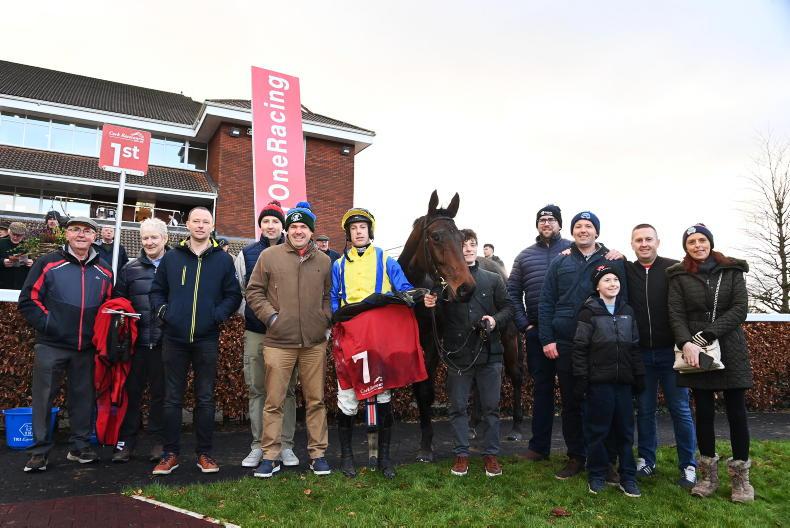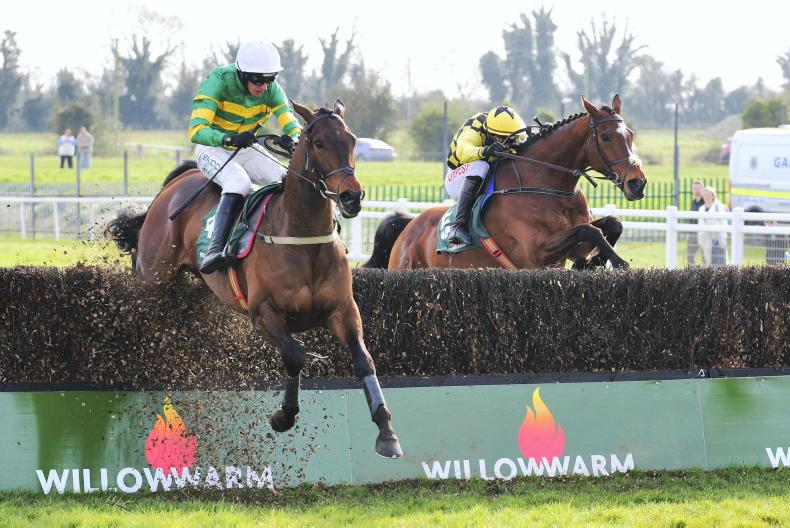IT probably got a little lost in all the furore surrounding Willie Mullins at Punchestown last year, the brilliant ride Brian Hayes gave Brahma Bull to win the Pat Taaffe Handicap Chase.
That can happen at the Punchestown Festival. When the Mullins bandwagon gets going, it’s all encompassing, and it just seems so easy for team Closutton. On this occasion, it was Willie’s 18th winner of the week and Hayes had remarkably become the 10th jockey to join the sequence.
But the Cork native had to be at his best to do so because Brahma Bull is an awkward horse to ride, often jinking at his obstacles and hanging when running in between them. Indeed Patrick Mullins paid kudos to Hayes when he won on Brahma Bull earlier in the season, saying he had put his hand up to ride the horse when others in Closutton didn’t.
In a 20-runner field at Punchestown, Hayes had the 10-year-old out in front, in a nice rhythm, jumping straight and well. Even when he made a mistake at the seventh last fence, he allowed his mount to regather himself, and he was back in front at the next fence.
The pair had four challengers on their outside going into the straight but Hayes forgoed the opportunity to go for everything, even when the well fancied Ten Ten went a half length up on him between the final two fences. All the time he was saving Brahma Bull’s final revs for after the last, after which there was a rail to guide the horse’s effort straight and true, maximising his energy in one direction.

Punch the air
They got back up to win by half a length and on passing the line, Hayes allowed himself a little punch of the air. It was a winner at Punchestown after he enjoyed a big Easter when he rode a double at Cork and then a Grade 2 winner on Easy Game at Fairyhouse. But it was also a great way to sign off his best ever season, his 33rd winner of the campaign.
You could call it a break-out season for him but a break-out season is only worth its title if indeed you stay ‘out’, and Hayes has done that and more so far this term. With all of the winter and spring to come, he already has 30 winners. He lies joint third in the jockeys’ championship and is operating at a 15% strike rate, comfortably the highest of his career.
At the age of 32, things have clicked for Brian Hayes.
“I think in any sport, momentum is key,” he reflected this week. “Any kind of success you get breeds more success. It’s just kind of kept going for me. I’ve had a good flow of winners without being massive or anything, but it’s definitely nice.
“The lads I’ve ridden for all along have continued to give me winners. All the years of going grand, going slowly away, it’s all kind of come together and added up because the winners I’ve gotten from trainers in the past are still there, and now Willie and Emmet are giving me a few winners and it’s come together nicely.
“You’re always trying to get on that nicer type of horse, you know? Things happen for you then. It’s the multiplier effect. Everything starts to roll, you get momentum, more confidence and you get used to a nicer type of horse, and that culminates in riding more winners. You just want to keep the head down now and keep it going.”
Perseverance
Perseverance has been key. Prior to last season Hayes had failed to break the 20-winner mark in 15 seasons as a rider on the track. That can be tough going for a rider and often lead to a one-way ticket across the Irish Sea or indeed giving up the profession altogether, but he was never deterred from doing the job he’s loved since he started riding for local trainer Thomas O’Leary during his transition year in school in Rosscarbery.
“I’ve always enjoyed it,” Hayes asserts. “I’ve always enjoyed the process of trying to improve, trying to make contacts, trying to get on better horses and then trying to stay on those horses. I’ve enjoyed the process the whole way.
“I suppose it’s nice now to be finally getting on that better type of horse that can do more for you. You would appreciate it a bit more.
“I did think about going to England. But I don’t think I was ever at a stage where I felt I had to go over. I was always going okay here, not that I was going brilliant or anything, but good enough to keep going. I never felt that I had a really bad season.”

Patience has also been key to Hayes’s journey but it’s striking that he is prospering now at a time when Irish jumps racing has never been more competitive, between the standard of horses, trainers and riders.
“It’s so competitive here now,” he asserts. “It’s just so hard to win. I see for so many trainers, just having a winner in Ireland is such a big deal, even in a low grade handicap.
“There was an amateur handicap hurdle about two weeks ago in Clonmel. The first horse was one of Sean Doyle’s, I think it cost €45,000 as a store, the second horse was one of Barry Fitzgerald’s that I didn’t think could be beaten and the third horse was one of Philip Fenton’s that went and won yesterday in Limerick. And that was just a bog standard 0-95 handicap hurdle. The standard in Ireland is just ridiculous.
“It’s great to ride big winners on nice horses but you’d get as much of a kick out of riding a winner for a smaller trainer, especially when you’ve sat on a horse of theirs a few times and you know there is a day in them. Sometimes you doubt that along the way but when it does happen, you’d be delighted for that trainer, maybe a guy who only has seven or eight winners a year.
“That’s a great kick.”
Hayes’s typical week is split between riding out for Willie, Emmet, John McConnell, Colm Murphy and Philip Fenton. He’ll also try to get down to Mick Winters or up to Michael Bowe. And then anywhere he can go. It’s about balancing his time because there are only so many days in the week and the aim is to do as much as he can for trainers that want him.
Circumstantial
But it’s not rocket science to suggest that part of the reason for Hayes’s recent success is circumstantial. There could be 50 top-class jumps riders in Ireland at present but there are only so many horses, so many races and even fewer big trainers. The quality is concentrated in the big yards these days and if you’re not on one of those teams, it’s very difficult to prosper.
Hayes agrees. He’s been riding out in Closutton for years now. You wait patiently, put in the hard work and take advantage of the opportunities when they come along. The retirement of David Mullins has made for more opportunities and also, intermittently, the injuries keeping Paul Townend on the sidelines.
He wouldn’t wish an injury on any rider, not least Townend who he’s good friends with, but that’s National Hunt racing, and you’ve got to kick on when you can.
“It’s a big help to be on the team,” he says. “I suppose last year I rode in Cheltenham and I had about seven or eight rides there. They were all for Willie, one for Emmet. You’d have to have a hell of a season riding freelance in Ireland to have eight horses good enough to go to Cheltenham.
“Only because I was on the team of jockeys Willie was using over there, I came out with those rides, and of course that’s where you want to be riding. It just makes it easier when you’re on the team.
“I also think when you’re riding more in the bigger races, it helps with your confidence as well. If I was to say one thing that’s made a difference to me over the last couple of years, it’s more confidence. I suppose when you’re riding more for Willie, you’re getting different riding instructions. You’d be talking to Ruby Walsh and David Casey as well, and they’d always give you advice.

“Maybe unknown to myself, I’ve been riding a little differently in the last couple of years based on different types of instructions. I guess that’s what you get at Closutton. The competition for rides is serious. You’ve got Danny and Patrick (Mullins), Bryan Cooper, Sean O’Keeffe, Rachael gets a few rides as well, but it has always been very open, everyone is always very helpful. It’s a very good atmosphere and that comes down to the calibre of horses there and the people.”
First taste
Hayes got his first taste of equine sport through showjumping but he knew he wanted to be a jockey as soon as he started working for Thomas O’Leary. He was at that yard not long after the likes of Newmill, Scarthy Lad and the dual Thyestes winner Preists Leap.
After O’Leary’s, he moved onto Shark Hanlon, turned conditional and rode out his claim during a long spell at Fennis Court. Both those trainers were integral to his development.
“Both Thomas and Shark were very good to me and I probably wouldn’t be where I am without the both of them,” Hayes says. “Thomas gave me a start. He was a top-class trainer and he won lots of good races. I’d still talk to Thomas now and he’d give me his opinion on a few things.
“Shark gave me all the opportunities and all the time to make the mistakes and get better. He was very good to get me going. I rode a Grade 2 winner for him on Hidden Cyclone in the Fortria Chase (2015) at Navan and that was kind of a good trace of my time there because I rode the same horse to win a bumper for my first winner for Shark.”
Further Grade 2 and Grade 3 wins have followed, the latest on Colm Murphy’s smart mare Impervious on whom he could well be reunited again in better races this season.
It hasn’t happened overnight but Hayes persevered and he’s getting more chances now. He’s in a much craved position where he can aspire to ride a Grade 1 winner and that’s the ambition. He went close twice last season with two seconds: The Shunter in the Manifesto Novices’ Chase at Aintree and James Du Berlais in the Champion Stayers’ Hurdle at Punchestown.
“It would be great to get that,” Hayes says. “It’s just so hard to get on a Grade 1 horse but I went close enough twice last year. It’s something any jockey would love to do. And then you just want to ride more winners than you did the year before.”
The aim is to continue to make hay.





 This is a subscriber-only article
This is a subscriber-only article
 It looks like you're browsing in private mode
It looks like you're browsing in private mode














SHARING OPTIONS: